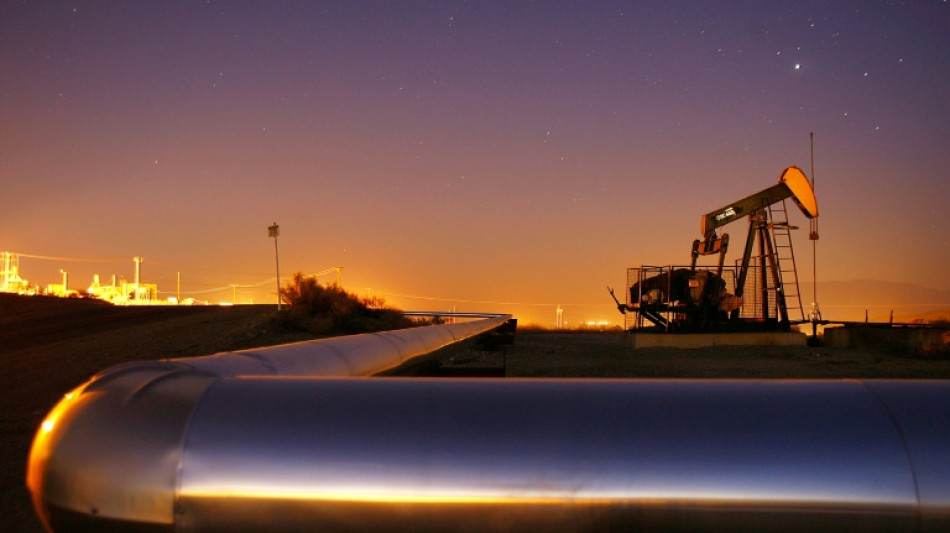

Oil prices surge as US bans Russian energy imports
Crude oil prices surged Tuesday as the United States banned Russian energy imports, while nickel prices rocketed to a record peak on Russian supply fears.
While remaining below Monday's peak of $139.13 a barrel, the main international oil contract, Brent, jumped 4.7 percent to close at $128.06, below the high point of the day.
The main US contract, WTI, rose by 4.1 percent to $124.36.
President Joe Biden announced a ban on US imports of Russian oil while Britain said it will phase them out by the end of the year.
EU nations, which receive roughly 40 percent of their gas imports and one quarter of their oil from Russia, instead opted to set a goal of cutting their Russian gas imports by two-thirds.
Meanwhile, Moscow warned earlier that in retaliation for sanctions imposed on it for the invasion, it could cut off natural gas supplies to Europe via the Nord Stream 1 pipeline.
While the United States imports less than 10 percent of its petroleum from Russian, analysts said the move was nevertheless important.
Market analyst Fawad Razaqzada at ThinkMarkets called it the "launch of an all-out economic war against Russia" by the United States.
The rise in oil prices pulled the rug out from under a rebound in European and US equity prices.
And amid increasing pressure to isolate Moscow economically after the invasion of Ukraine, Coca-Cola, McDonald's and Starbucks joined the growing number of major firms closing up shop in Russia.
On Wall Street, the Dow Jones Industrial Average fell 0.6 percent, closing near its lowest point in a year.
London managed to squeak out a gain of 0.1 percent, Frankfurt ended the day flat and Paris shed 0.3 percent.
- Fanning inflation flames -
Commodity prices also felt the effects of the growing isolation of Russia.
The London Metal Exchange suspended trade in nickel after the base metal spiked to a record $101,365 a tonne as Russian supply concerns sparked sharp volatility.
Nickel is used to make stainless steel and batteries for electric vehicles, and prices have risen from around $20,000 a tonne in January, putting huge pressure on manufacturers.
Gregori Volokhine of Meeschaert Financial Services warned of the potential for "collateral damage" from the price spike.
He said "the market is so nervous that at the slightest positive or negative headline, it reacts to avoid being too exposed," he told AFP. "Everyone tries to limit the risks."
Gold rose as high as $2,069.25, a level unseen since August 2020.
The Ukraine crisis comes just as uncertainty was rising owing to surging prices caused by a spike in demand for oil, tight supplies and pandemic-induced supply chain snarls, among other things.
Central banks are beginning to raise interest rates to tamp down rising prices, with the US Federal Reserve set to move next week -- but markets remain fearful of stagflation, a vicious mixture of low economic growth and elevated inflation.
"There are fears we are heading for a period of stagflation in the eurozone given the energy crunch and the region's exposure to Russia," noted ThinkMarkets' Razaqzada.
- Key figures around 1330 GMT -
Brent North Sea crude: UP 4.7 percent at $128.06 per barrel
West Texas Intermediate: UP 4.4 percent at $124.70
New York - Dow: DOWN 0.6 percent at 32,632.64 points (close)
New York - S&P 500: DOWN 0.7 percent at 4,170.7 (close)
New York - Nasdaq: DOWN 0.3 percent at 12,795.55 (close)
EURO STOXX 50: DOWN 0.2 percent at 3,505.29 (close)
London - FTSE 100: UP 0.1 percent at 6,964.11 (close)
Frankfurt - DAX: FLAT at 12,831.51 (close)
Paris - CAC 40: DOWN 0.3 percent at 5,962.96 (close)
Tokyo - Nikkei 225: DOWN 1.7 percent at 25,790.95 (close)
Hong Kong - Hang Seng Index: DOWN 1.4 percent at 20,765.87 (close)
Shanghai - Composite: DOWN 2.4 percent at 3,293.53 (close)
Euro/dollar: UP at $1.0895 from $1.0854 Monday
Pound/dollar: DOWN at $1.3096 from $1.3104
Euro/pound: UP at 83.17 pence from 82.83 pence
Dollar/yen: UP at 115.69 yen from 115.32 yen
burs-rl/hs/sst
E.Goossens--JdB



